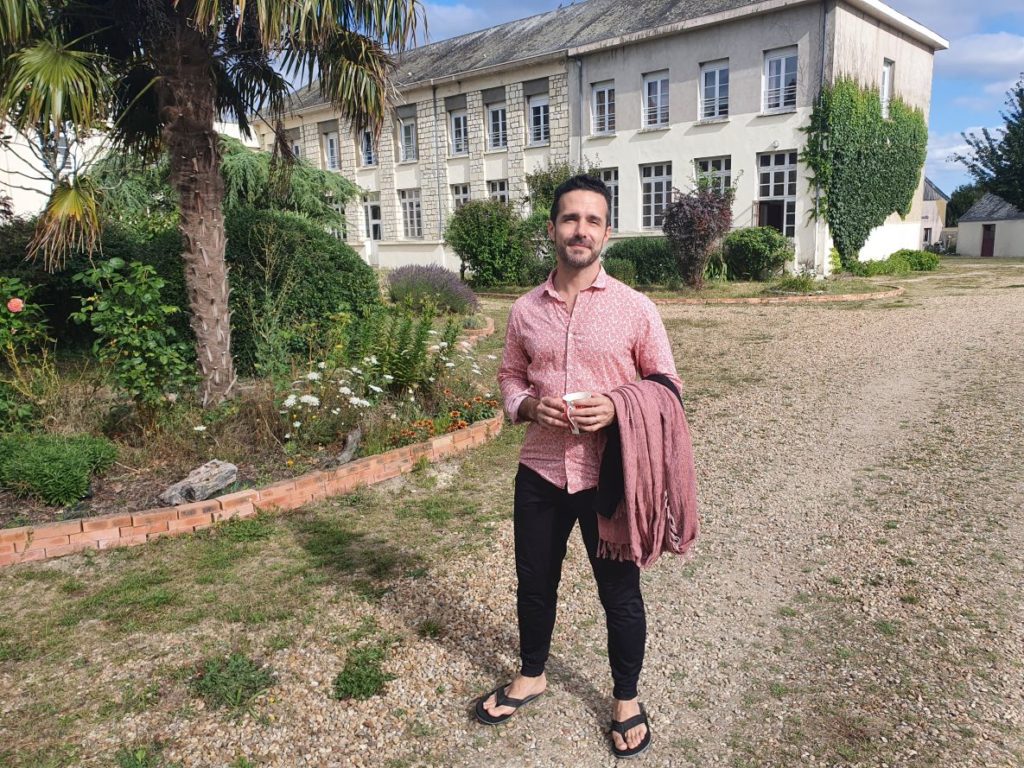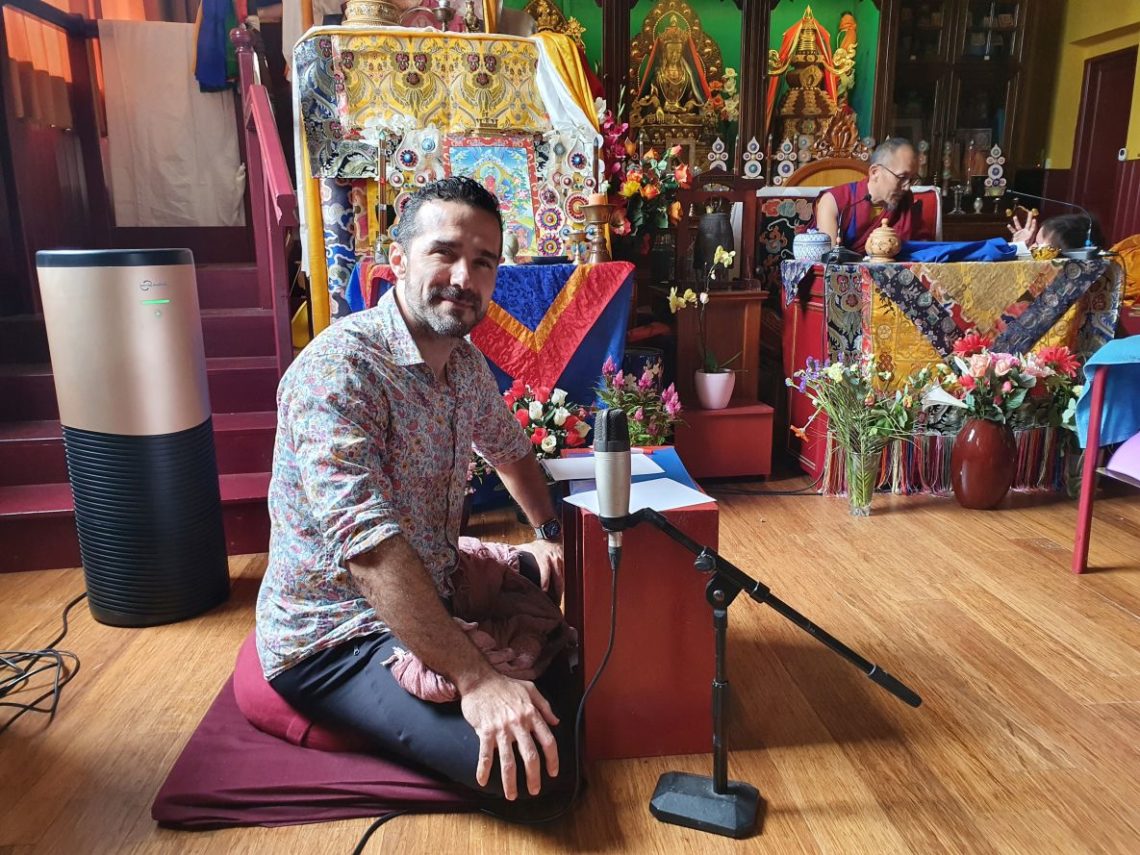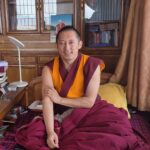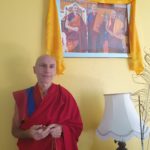Marc has spent most of his adult life with Bon and many people see him translating teaching at Shenten Dargye Ling. “I put my heart in it, trying to keep people inspired with all means at my disposal,” he says.
Marc, when did you come to Shenten for the first time?
I think it was in 2006. I was not there in 2005 for the first retreat after opening the center, but I went to retreats with Yongdzin Rinpoche in Vimoutiers and Paris before. I met Rinpoche in the autumn in 2001 in Paris, during a weekend teaching. I remember it was extremely cold and I also remember a very clear, blue sky above Paris. I had been already involved in Buddhism and Dzogchen, but mainly in the Nyingma tradition. My first contact with an actual Tibetan Lama was with Dzongsar Jamyang Khyentse Rinpoche.
The filmmaker?
Yes. I attended a general / public talk he gave in Paris. Then the first “traditional” teaching that I received was from HH Sakya Trizin, the head of the Sakya school, then I studied with Sogyal Rinpoche who had his center, Rigpa, in Paris. The translator of Yongdzin Rinpoche at that time, François Calmès, who was also active at Rigpa, spoke very highly about Rinpoche and this brought me to Bon.
Quite some time ago…
I am forty-two now so yes, half of my life has passed since then. There was somebody new who came for the teaching last summer and he was somewhat “impressed” by how long my friend and I had been following the teachings, but, to speak the truth, we were actually a bit ashamed that we were still so ordinary after so long ! (laughing). But it depends on the perspective from which you look at it. I can see benefits of the teaching on myself, definitely.
Could you be specific about the benefits?
I used to be melancholic. Sad. There is a famous poem “The rose is without why; it blooms because it blooms, It pays no attention to itself, asks not whether it is seen” – and so was my sadness, I felt it without any obvious / tangible reason. From one point of view, everything was just fine and yet, there was a “blanket” of sadness which made my life not enjoyable. It hindered me in my actions, blocked my initiative. Everything required lots of effort to be done, or at least this is how I felt. The teaching and the practice helped me a lot in dispelling this obstacle. Now I am much more at ease and at peace. Life flows more easily. Nothing very profound or mystical, I would say, but my life has improved. I attribute it to the effect of the teaching even if, in part, of course, it could also be just maturing from what is a mindset of a young person. But I know people who are getting melancholic with aging and I think the teaching saved me from that tendency. I can feel I am on the right track.

Do you remember your first impressions of Shenten and its community?
Yes, it felt simple and relaxed, compared to other Tibetan Buddhist communities that I knew, somehow heavier and more strict. There was a kind of atmosphere of ease. Of course, nothing is ideal, there were problems too, people sometimes argued, but in general, it was more informal and simpler. It was also smaller, which does play a role. The community counted one hundred, one hundred twenty people, maybe, which meant we could have a better access to the teachers, and this felt priceless, especially coming from other sanghas, which were much bigger.
You seem to me to be quite familiar with the Tibetan language. Since some time you have been translating teachings at Shenten and I noticed that you can easily catch key words in Tibetan…
Yes, I did three years of Tibetan studies at the university, as a young man, more or less contemporarily with my engagement in the opera singing. My professional life has been quite diverse and changed its course several times.
When and where you trained as an opera singer?
In the conservatory in Paris, the period was 1999 – 2006 . There I also started an embryo of a beginning of a career but then I stopped. Too much pressure, and also I felt as if my butt was sitting on two chairs, as we French say. The other chair was my aspiration to dive deeply into my practice. I was even attracted to monkhood. I was torn apart with those two contrasting inclinations: a passion for music and longing for a spiritual life, on the other hand. And the fact is that I have never gone one hundred percent in one or the other direction. I mean, I became a singer and the beginnings looked promising, but I did not give myself to it fully and completely, because it felt somehow pointless. I could not go “all in”, as they say in poker. Opera singing is a highly competitive thing – you cannot be there without engaging fully. It can be very stressful too, so at some point I stopped, it was in 2009.
Did you continue your studies of Tibetan language and culture?
I did not complete the course and, therefore, obviously, did not obtain the bachelor’s degree. I somehow could not see myself in academia. So it happened that I have no university degree; although the diploma I received from the conservatory is highly respected within the fields of music and dance, it is not equivalent to a university degree.. And when I stopped doing music, it was a little complicated because, from an academic point of view, all I have is my high school diploma.
I am curious to know what happened then.
I have always been interested in human science, and studied economics as an autodidact.So I decided that I would try to get work in finance. Without a proper diploma it was not that easy, but I managed my way through. My entry point was through sales. I was calling people and offering them investments, but I really did not like that. Luckily, I managed to move into the advisory field and worked as a wealth manager, for people who are well off. Not only did I enjoy it much more, but I could also apply what I learned in the arts. When done properly it can be a holistic job, not just about finance: you take into account the family situation, personal objectives, preferences… Also, the quality of the relationship matters a lot. I did this for four years and stopped when I divorced.
From whom?
I was married to a musician. I was young when we met, and she was even younger. After I interrupted my musical career, I looked for jobs which could provide for both of us, and from that point of view, finance looked like a good choice. When I divorced, there was only one mouth to feed, and this granted me more freedom. And I moved back to music. First, as a piano and singing teacher for children, and then going back on stage; not in classical music anymore, instead, I performed a “jazzy” repertoire in five star holiday resorts in Bali and Mauritius where I grew up. Later on, I had the opportunity to get back to classical music, especially operettas.
In Bali you met your current wife, right?
Yes, I met Mandana there and we married after seven years of being together, in 2022. . At the time, I was only traveling in Bali, and she was already living there. I moved there a few months after we met, and started working in Bali. It went quite well for a few years, until covid erupted. As tourism came to a complete halt then, I lost all my contracts in entertainment. Everything was frozen. Anyway, at the time, I was actually already planning to stop working in the resorts and move back to classical music. It would have been tough, but not impossible. I would have aimed at singing in some smaller, provincial opera houses. With covid, I got more immediate preoccupations: I was left without any financial means. As a freelancer I did not get any compensation, neither from a company nor from the government. But I was very lucky to have my family. We stayed with my parents in Mauritius for quite a period.
You developed a new profession during the pandemic, as far as I know.
Yes, the situation was not a joke, but I took that challenge as an opportunity. I had a roof above my head, at my mum´s place, and so I dived into studying computer science, by myself, from scratch. There is actually lots of amazing material online, made by prestigious universities, most of them for free. I managed to be disciplined enough to create a personal curriculum and follow it.
What kind of job did it bring to you?
Now I work as a data scientist, in the field of machine learning and AI. I work for a startup in Mauritius. In order to generate some cash flow while we develop our core product, we do some “data consulting” on the side: creating data pipelines and doing some analytics and data mining as we call it. But the core project is to develop what is known as a “Recommender System” powered by AI, which would help small retailers to boost their business, by telling their customers what other people with similar profiles bought. This is how a big part of sales on Amazon works. I do like the job, but I would like to reach an area where I really can make a difference, using data and AI to do something more socially useful, maybe to help fight cancer or global warming.
Or fighting artificial intelligence, no? Isn´t it threatening to make many people lose their jobs and bringing other big dangers?
No, I think we that should not fight it, but rather find ways to work with it, leverage it. Otherwise, I would not do that job… So, that´s where I am now. I have finally a job that I can do from anywhere as I have always wished. But I am paid in Mauritius rupees now which is not the strongest currency in the world, and this come with its limitations. My goal is gaining enough expertise to become a consultant, working on my own, and be able to live in nature, maybe in the mountains, working a few months a year and dedicating the rest of my time to practice. Leading a very simple life, with the luxury of free time, in natural surroundings conducive to practice.
Your English is so good. Is it due to the opera singing?
Probably. Languages are a form of music, I guess. I have been exposed to many languages when studying classical signing. Also, Mauritius is a former British colony. An average Mauritian person speaks much better English than the average French person.
I cannot detect a French accent.
I can speak with a French accent if you want. I can do it (imitating it).
At some point you have become one of the translators for the teachings organized by Shenten Dargye Ling. In particular, you translate Khenchen Tenpa Yungdrung Rinpoche´s teaching. Do you remember your first translating experience?
I think it was still at Rigpa in Paris, and it was not a live teaching, but a replay of a teaching which I translated in French. You know, if you are a singer, it helps, you know how to work with your voice…
Your voice is pleasant to hear…
Thanks, but it is not only a matter of having a good voice, but also being used to being “on stage”, using your voice and body, not being shy etc…
Have you ever translated for Yongdzin Rinpoche?
Never, or maybe for five minutes, an informal talk. That would have been another story, because we must admit that Rinpoche´s English is very personal and not easy to translate.
What was your first translation – or more precisely interpreting, to distinguish it from written translation – for the Bon community?
My first time was translating Khenpo Gelek during a weekend of teachings in Paris. Long time ago.
How was it? Khenpo Gelek also uses English in his own way.
Yes, it was probably a bit harder than translating Khenchen Rinpoche, but much easier than translating Yongdzin Rinpoche.
How long have you been translating Khenchen Rinpoche´s teaching?
Ten years I would say, more or less. We should ask Christophe to check.
You are quite familiar with the subject, you know many Tibetan dharma words…
When I was younger, I was quite “obsessed” with studying the teaching and I used to read many, many books, and this helped with the learning structure and vocabulary of the teachings. It obviously makes translating easier. And I also had this friend, Francois, whom I mentioned earlier. He translated for many lamas. I could flood him with all kinds of questions regarding the teachings. I also had the chance to discuss lots of things with Philip Cornu and Stéphane Arguillère, both highly knowledgeable scholars who translated texts of the doctrine. Stéphane actually translated Yongdzin Rinpoche after Francois. Both were generous enough to bear my endless and various questions.
Lately, the translation has been shared between you and Dominique, Yungdrung Tenzin. You both have a very different, very personal style of translating.
I would say that I am humbly trying to follow the lineage of Francois Calmes. He was really impressive as a translator. He could sit, not taking a single note, with Yongdzin Rinpoche speaking for ten minutes, and then was able to reproduce it perfectly. I was often inspired by his translations, as he made things clearer and more alive for me.
There is a dilemma which all translators face: whether to stick to the letter or to the spirit of what was said. And I have always leaned toward the latter: preferring translating the essence, the spirit, to a word-for-word translation. With this, of course, you can drift or overdo things sometimes. But I have always felt reassured by the fact that Khenchen Rinpoche can follow the translation quite well and indeed sometimes he did correct me. But since it does not happen often, it makes me feel that I probably deliver the meaning of the original text correctly. If sometimes I over-emphasize something, it is because I really put my heart into it. My aim is to inspire people and keep them interested.
You and other translators offer your service for free, right?
Yes, this is our offering to the sangha. And it is true that when I translate, I cannot enjoy the teaching in the same way as when I just listen and contemplate on what was said. Originally, I did not talk about it as a work but actually, it is a work, you have to be very alert and conceptually active all the time. And sometimes I do feel quite tired after translating, especially when I did both the morning and afternoon sessions. I realized that I really had to get enough sleep to restore my energy.
Pictures: Jitka Polanská













William Scott
March 16, 2024 — 5:14 pm
Great Article! Mark is an such an inspiring and talented person. Although I do not understand the French language his incredible melodic voice is so comforting and enjoyable to hear.